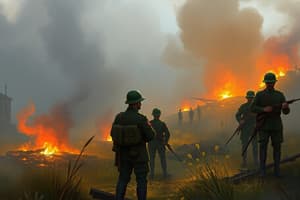Podcast
Questions and Answers
What is Nationalism?
What is Nationalism?
A deep devotion to one’s country.
What is Imperialism and how did it affect the countries in Europe?
What is Imperialism and how did it affect the countries in Europe?
A policy where a strong nation seeks to dominate other countries politically, economically & socially. Countries fought for colonies overseas pushing each other along the way.
What is militarism and how did it affect countries in Europe?
What is militarism and how did it affect countries in Europe?
Policy of glorifying the military power and keeping a standing army always prepared for war. It created an army race which made citizens patriotic but frightened other countries.
Define Alliance. What was the purpose of European alliances?
Define Alliance. What was the purpose of European alliances?
How did Kaiser Wilhelm II react to the alliance with Russia when he took control over Germany?
How did Kaiser Wilhelm II react to the alliance with Russia when he took control over Germany?
What are the M.A.I.N causes of the great war?
What are the M.A.I.N causes of the great war?
Describe the Schlieffen plan.
Describe the Schlieffen plan.
What was the key aspect of the Schlieffen plan?
What was the key aspect of the Schlieffen plan?
Why didn’t the Schlieffen plan work?
Why didn’t the Schlieffen plan work?
What were the spaces between the trenches called?
What were the spaces between the trenches called?
Flashcards are hidden until you start studying
Study Notes
The Great War (1914-1918) Terms
- Militarism: Policy of glorifying military powers, keeping a standing army, and always being prepared for war.
- Triple Alliance: Alliance between Germany, Austria-Hungary, and Italy.
- Triple Entente: Alliance between Great Britain, France, and Russia.
- Schlieffen Plan: German battle plan to fight France first, then Russia.
- Central Powers: Germany, Austria-Hungary, and Ottoman Empire, named due to their location.
- Allies: Britain, France, Russia, and USA against the Central Powers.
- Western Front: Deadlock region in northern France.
- Trench Warfare: Miles of dug-out parallel trenches along the Western Front to protect soldiers from enemy fire.
- Eastern Front: Stretch of battle field along German and Russian borders.
- Woodrow Wilson: President of the USA.
Causes of the Great War
- Nationalism: A deep devotion to one's country, causing competition between nations.
- Imperialism: A policy where a strong nation seeks to dominate other countries politically, economically, and socially, leading to a fight for colonies overseas.
- Militarism: A policy of glorifying military power, leading to an arms race and making citizens patriotic but frightening other countries.
European Alliances
- Alliance: A union or association formed for mutual benefits of countries involved.
- Triple Entente: France, England, and Russia.
- Triple Alliance: Germany, Austria-Hungary, and Italy.
Events Leading to the Great War
- Kaiser Wilhelm II: Cancelled the treaty with Russia in 1890.
- Assassination of Franz Ferdinand: Archduke and heir to the Austria-Hungarian throne, assassinated in Sarajevo, Bosnia in 1914.
- Austria-Hungary: Declared war on Serbia, starting the Great War.
Schlieffen Plan
- Key aspect: Speed, quick victory over France.
- Plan: Germany would quickly attack/defeat France, then quickly shift to the Russian border and defeat them.
- Failure: Germans were held up by Belgium, then France, and Russia invaded Germany earlier than expected, and England interfered.
The Great War
- Central Powers: Germany, Austria-Hungary, and Ottoman Empire.
- Allies: France, England, Russia, Italy, and later on, USA.
- No man's land: The spaces between the trenches.
- New weapons: Tanks, U-boats (submarines), airplanes, poison gas, and machine guns.
- Russia's great asset: The number of soldiers.
- European colonies: Provided soldiers and resources to help fight the war.
- Germany's policy: Unrestricted submarine warfare, sinking any submarine without warning.
Studying That Suits You
Use AI to generate personalized quizzes and flashcards to suit your learning preferences.




